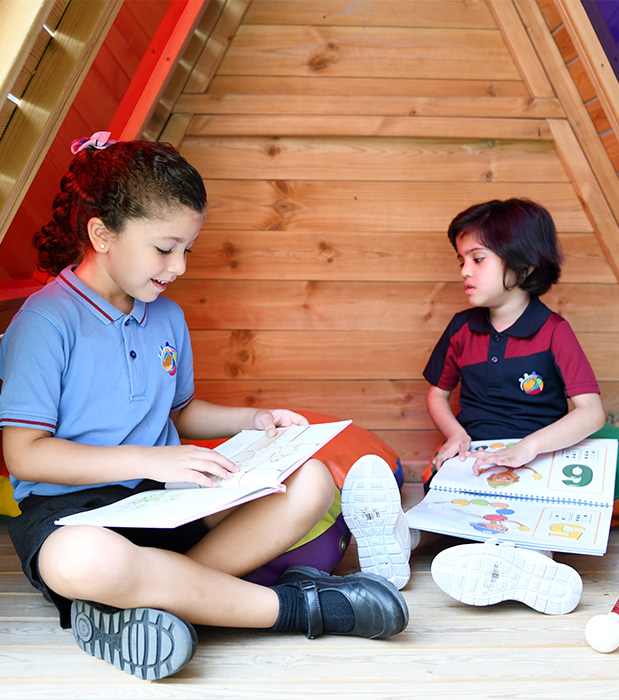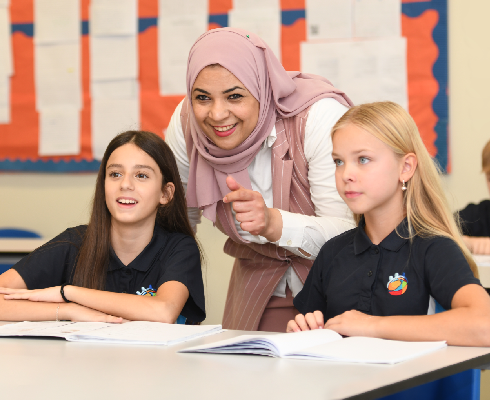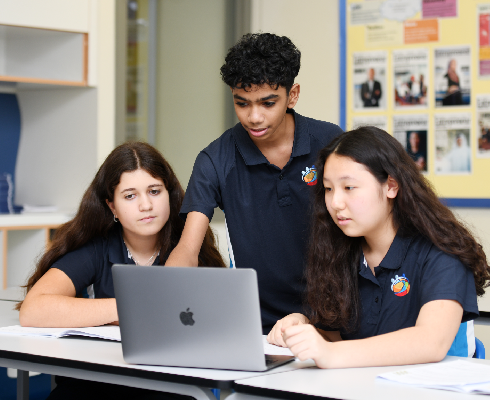
GIS - Inclusion
Philosophy
At GEMS International School (GIS), inclusion is at the heart of our philosophy, built on the values of respect, trust, and ambition. Our Inclusion Policy is a comprehensive framework that supports the school’s mission to provide equitable opportunities for every student, ensuring that all members of our diverse community feel valued and empowered. This policy aligns with our three-year strategic plan and reflects our commitment to creating an inclusive environment for every learner.
GIS is proud to be an inclusive school, embracing students of all abilities and backgrounds. Our vision aligns with Goal 4 of the United Nations Sustainable Development Goals (SDGs), which calls for inclusive and equitable education. We foster strong partnerships with students and families, promoting ambition and success for all. We follow a rights-based model of support, recognizing that each student is unique, and work together with our community to ensure proactive identification of needs and appropriate support.
In line with KHDA’s Inclusive Education Policy Framework, GIS provides high-quality education that meets the needs of all learners, including Students of Determination (SD), English Language Learners (ELL), and More Exceptionally Able (MEA) students. Our guiding principles emphasize that all students benefit from inclusive teaching practices, and we prioritize early identification of additional needs to ensure timely support. Through continuous collaboration and professional development, we ensure that every student has the opportunity to learn and succeed in a supportive and inclusive environment.
How are students identified?
As per the Inclusion Policy, a Student of Determination (SD) is identified as a student who is experiencing a physical, mental, intellectual or sensory impairment which, in interaction with various barriers, restricts the student’s full and effective participation in education on an equal basis with peers of the same age.
The GIS Inclusion Support Team works closely with teachers, families, and external specialists to accurately identify students' needs and barriers to learning. Using a combination of internal and external assessments, along with teacher evaluations, we continuously monitor and track student progress. Comprehensive Assessments of Need (AoNs) are conducted during admissions to ensure that necessary support is in place from the start.
Students identified as needing additional assistance are included in the school’s Inclusion Support Register, where they can receive appropriate support, even without a formal diagnosis. GIS follows a rights-based model of support aligned with the United Nations Convention on the Rights of Persons with Disabilities (UNCRPD).
Levels of Inclusion Support at GIS
GIS offers three levels of support based on the KHDA’s Categorization Framework for Students of Determination:
-
Level 3: students who require highly individualized and specialized provisions, often with the support of an additional adult.
-
Level 2: students needing ongoing, long-term support to address significant barriers to learning. Level 2 support is divided into two sub-levels (2a and 2b), depending on the intensity of intervention required.
-
Level 1: students who can access the curriculum independently, with some accommodations.
Graduated Approach and Support Provisions
GIS follows a graduated approach to support, continually monitoring and adjusting the provisions to meet each student’s evolving needs. This approach allows us to refine support as needed to promote student progress toward independence in learning. Students on the Inclusion Register benefit from access to an Inclusion Support Teacher (IST) and a personalized Student Profile, which outlines their strengths, barriers, and strategies for learning.
Access Accommodation Arrangements
Exam access accommodations are provided based on the student's specific needs, ensuring they can fully participate in formal assessments.
In Grades 11 - 12 students requiring access accommodation arrangements will need to provide the school with a report from an approved Educational Psychologist. Without this evidence students will not qualify for access accommodation arrangements in the Grade 12 World Exams. School provides a list of recommended external providers and can facilitate in school assessments.
Additional Fees
Level 1 and Level 2 support is at no additional cost.
Level 3 support can incur additional fees up to 66,000 AED per annum, payable termly in advance. The school will speak to parents individually regarding the level of support required.
What information will I receive?
Students identified as requiring additional support from the Inclusion Support Team will receive a personalized Student Support Plan. This will outline an overview of their personalized provision and may incorporate personalized targets. More detailed information regarding the varied support plans is available in the Inclusion Policy and Parent Information Handbooks.
Alternative Pathways
GIS is proud to offer alternative pathways to students. We offer highly personalized pathways designed for students who may not be able to access the mainstream curriculum in a meaningful way. In PYP we offer support of foundational life skills, which are outlined in a students Individual Education Plan.
In secondary, we have a dedicated functional life skills programme; Tareeqi (meaning ‘my way’ in Arabic). This programme allows students to continue benefiting from the inclusive environment of a mainstream setting and the advantages of an IB education, while providing tailored curriculum adaptations to meet their individual needs.
MYP students in the Tareeqi Programme engage in a mix of ASDAN certifications and qualifications, alongside selected MYP subjects, depending on their personal learning needs.
Post-16 Tareeqi students will graduate with an iBTEC Level 1 in Vocational Studies and ASDAN certifications, equipping them with essential life skills and a strong foundation for future opportunities.
Inclusion Policy and Parents Handbooks
The school has comprehensive Parent Information Handbooks and Policies outlining the support provision in further detail.
-
Inclusion Policy 2024-2025
-
PYP Inclusion Handbook
-
Secondary Inclusion Handbook



